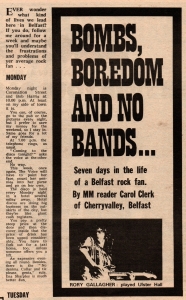 Before she was a music journalist, Carol Clerk was a teenage music fanatic in Belfast, navigating the local scene, or what was left of it, as the Troubles intensified in the early 1970s. Carol wrote her first article for Melody Maker, published May 23, 1973, when she was just 18. Ultimately, she became News Editor of the music paper in London.
Before she was a music journalist, Carol Clerk was a teenage music fanatic in Belfast, navigating the local scene, or what was left of it, as the Troubles intensified in the early 1970s. Carol wrote her first article for Melody Maker, published May 23, 1973, when she was just 18. Ultimately, she became News Editor of the music paper in London.
In ‘Bombs, Boredom and No Bands’ she chronicled a week in her life in a music scene too barren to contemplate: a teenage Carol and her friends sorely reminisce on the days when bands actually came to Belfast, bands who at the time the article was written became deterred by increasingly frequent, indiscriminate bombings in a dirty conflict. Between exhausting day trips to Dublin where bands did play and the odd sub-par, overpriced disco, the kids rarely got a chance to go to a gig to escape what the world was coming to around them.
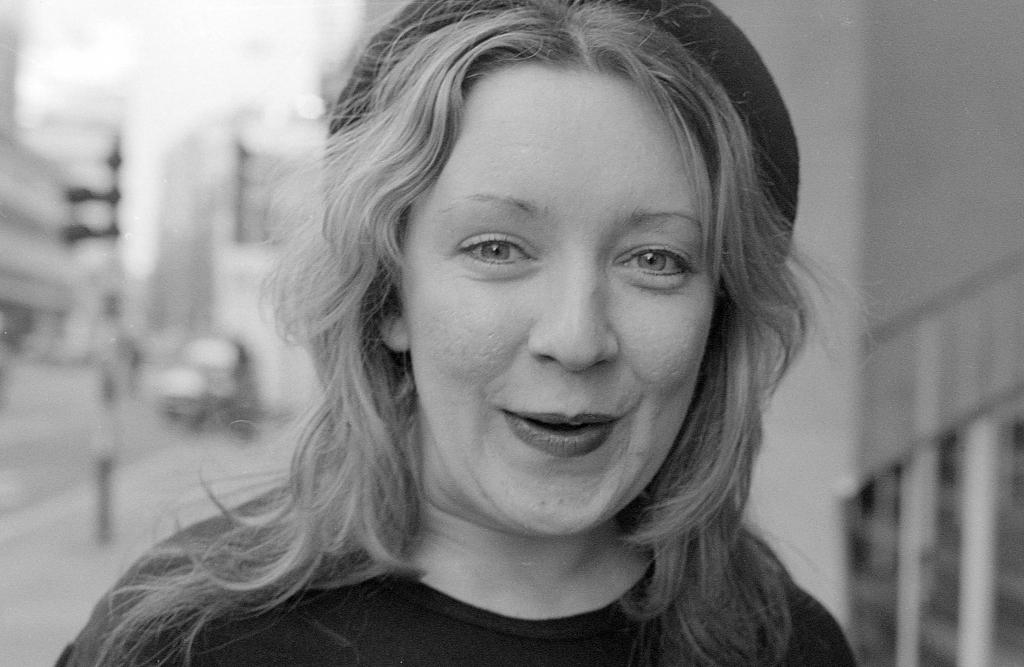
Carol Clerk by Mick Middles
Carol’s family recently discovered some of her old scrapbooks from this time, dated 1970-1972, that I was lucky enough to view. There are four, each containing newspaper cuttings, photos, press releases and souvenirs on the same, inexhaustible subject: Rory Gallagher.
It’s an age-old path: discover a band or artist, become obsessed with said band or artist, claw your way through any and all material, just to find out more about them.
But having read both ‘Bombs, Boredom and No Bands’ and her scrapbook archives, I get the feeling that, for Carol, this was an involuntarily isolated endeavour – a way to channel her passion for music at a time when her generation was robbed of the live music experience.
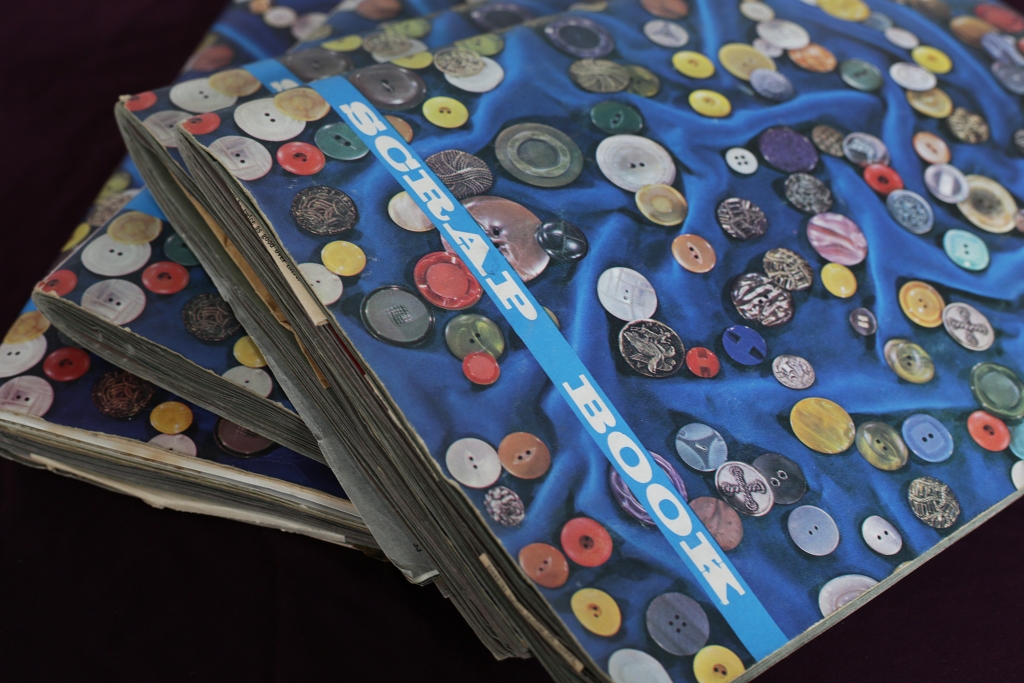
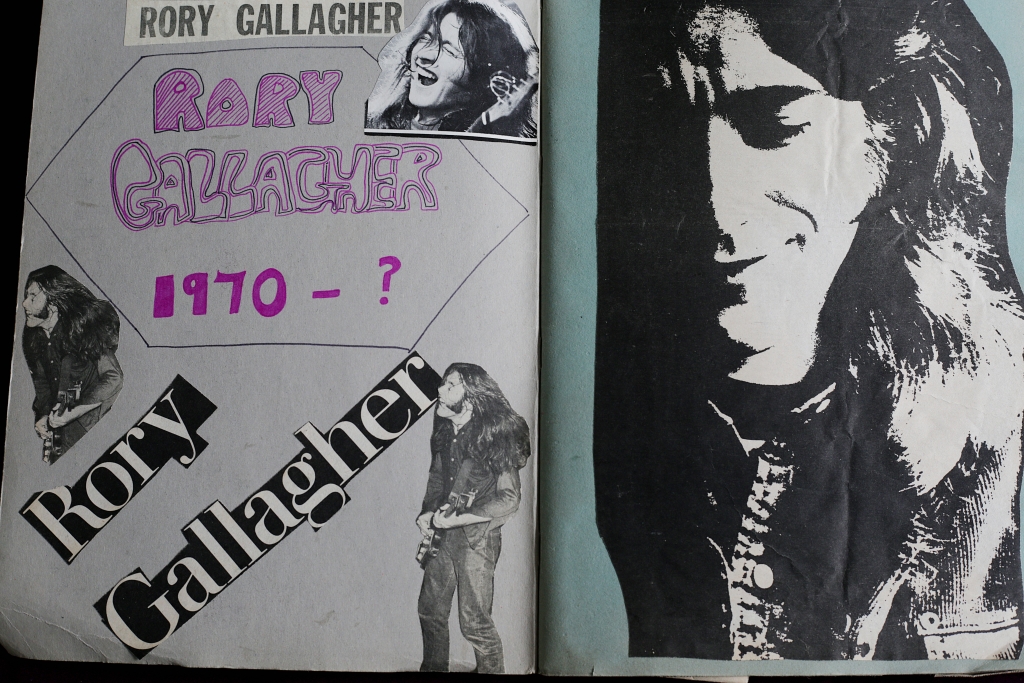
Back to Rory, Ireland’s enduring guitar god, somewhat mythologised by his untimely passing.
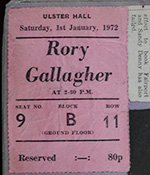 Carol’s archives are filled with interviews with Gallagher, dozens of album chart cuttings with entries of his records circled in pen. Gig reviews all comment on Gallagher’s unwavering energy and stage presence, I’m sure there were moments when Carol imagined herself in the audience through these writings.
Carol’s archives are filled with interviews with Gallagher, dozens of album chart cuttings with entries of his records circled in pen. Gig reviews all comment on Gallagher’s unwavering energy and stage presence, I’m sure there were moments when Carol imagined herself in the audience through these writings.
Chances are that parts of Carol’s collection are now rare, important accounts of seminal performances likely lost to dusty attic corners, general disintegration and the digital age.
Carol pieced together a narrative of Gallagher’s career as it happened. From his departure from the band Taste to his triumphant solo return to the spotlight. One of the first things Gallagher did in his solo career was give the kids of Belfast what they sorely needed: a roaring belter of a gig that took place in Ulster Hall, January 1 1972.
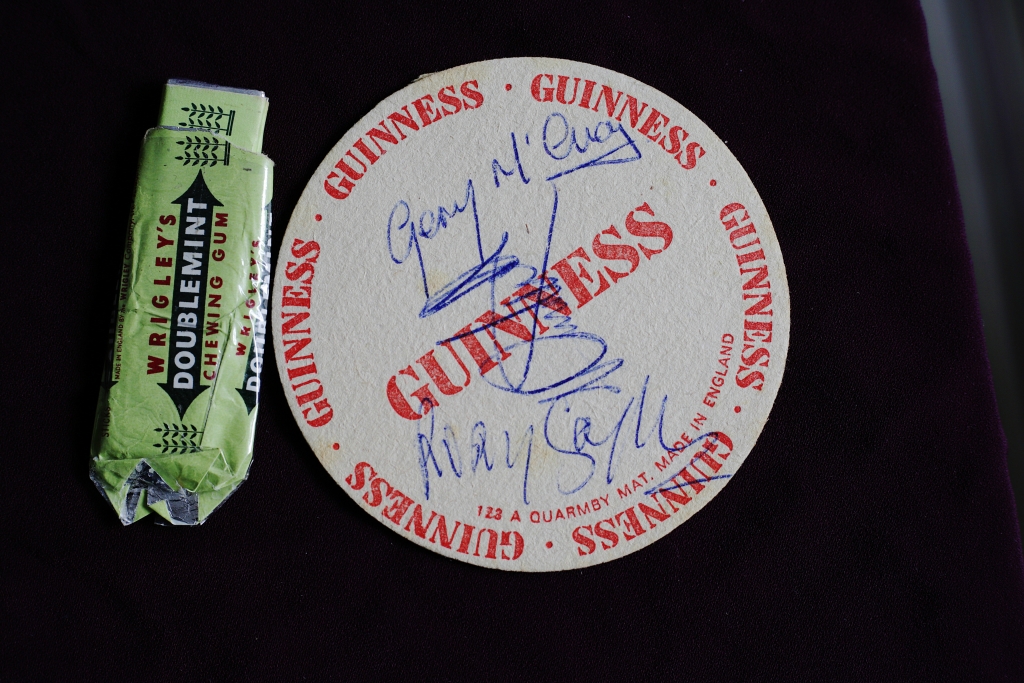
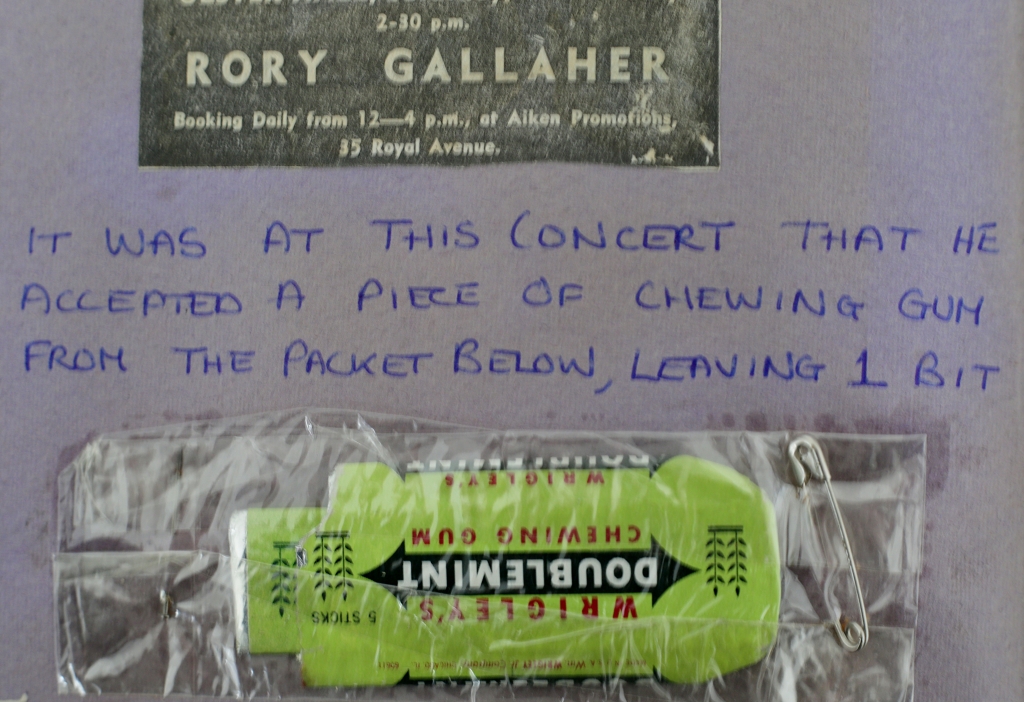 The crown jewels of the scrapbook are the materials she kept surrounding that gig, which Carol attended: her ticket, an old Doublemint packet from which Gallagher took a stick of gum, and a beer mat signed by Rory and his band. Priceless stuff.
The crown jewels of the scrapbook are the materials she kept surrounding that gig, which Carol attended: her ticket, an old Doublemint packet from which Gallagher took a stick of gum, and a beer mat signed by Rory and his band. Priceless stuff.
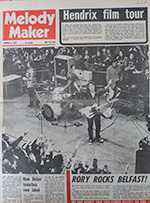 A particularly moving find was a front page article from Melody Maker about the gig, written by Roy Hollingworth as he joined Rory and company in Belfast. He writes accounts of the IRA allegedly promising to “leave [the gig] alone”, hearing bombs go off in the distance to the tune of the band’s nervous (likely disbelieving) laughter, and just having some pints with Queens students.
A particularly moving find was a front page article from Melody Maker about the gig, written by Roy Hollingworth as he joined Rory and company in Belfast. He writes accounts of the IRA allegedly promising to “leave [the gig] alone”, hearing bombs go off in the distance to the tune of the band’s nervous (likely disbelieving) laughter, and just having some pints with Queens students.
“I see no reason for not playing Belfast. Kids still live here.”, Rory is quoted saying.
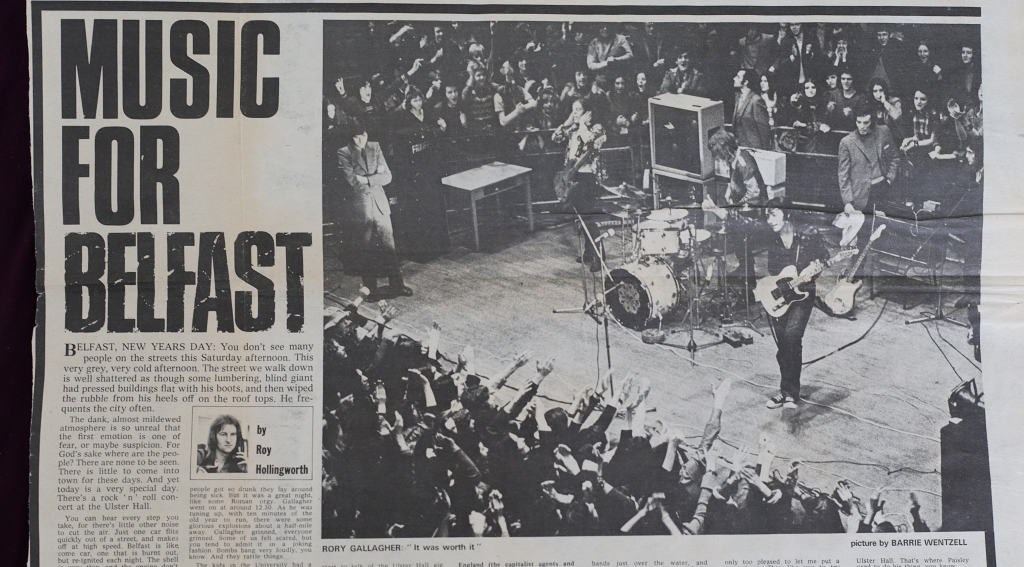 This review is an essential account of witnessing the Troubles as a young person: the black humor, the lingering tension, and the hope for better days that seeped through it all in the form of a rock concert.
This review is an essential account of witnessing the Troubles as a young person: the black humor, the lingering tension, and the hope for better days that seeped through it all in the form of a rock concert.
What emerges is Gallagher’s deft respect for the relationship between the artist and their live audience, how clearly he understood the necessity of this connection.
In the Northern Irish context this dedication meant more. Gallagher created a space for respite from danger, to have some pints and dance with pals, even if just for a few hours.
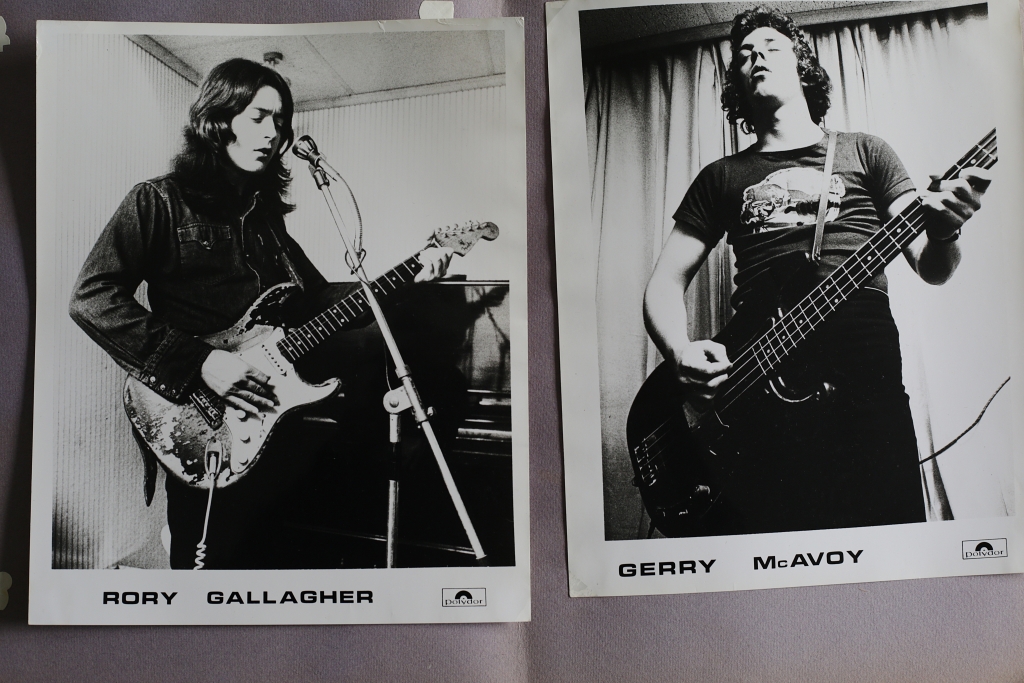 Carol’s scrapbooks preserve this heartening moment amidst the darker days of Belfast’s past and show the beginnings of an impactful journalistic career; we should count ourselves lucky they have emerged.
Carol’s scrapbooks preserve this heartening moment amidst the darker days of Belfast’s past and show the beginnings of an impactful journalistic career; we should count ourselves lucky they have emerged.
Carol passed away in 2010, aged 55. She had an enduring career in her field, having written books on acts such as Madonna, The Pogues and the Damned, as well as winning a PPA award for her coverage of Live Aid in 1985.
Preceding these achievements she was a Belfast girl who had the resolve to document a saddening but unique period in our local scene, which thankfully does nothing but flourish these days.
Eleanor Gilmore
(Carol Clerk’s Rory Gallagher scrapbooks will be available to view for research purposes in the Oh Yeah Music Centre archive collection from April 29, 2024. With thanks to Stephen and Sarah Clerk.)







 Twitter
Twitter